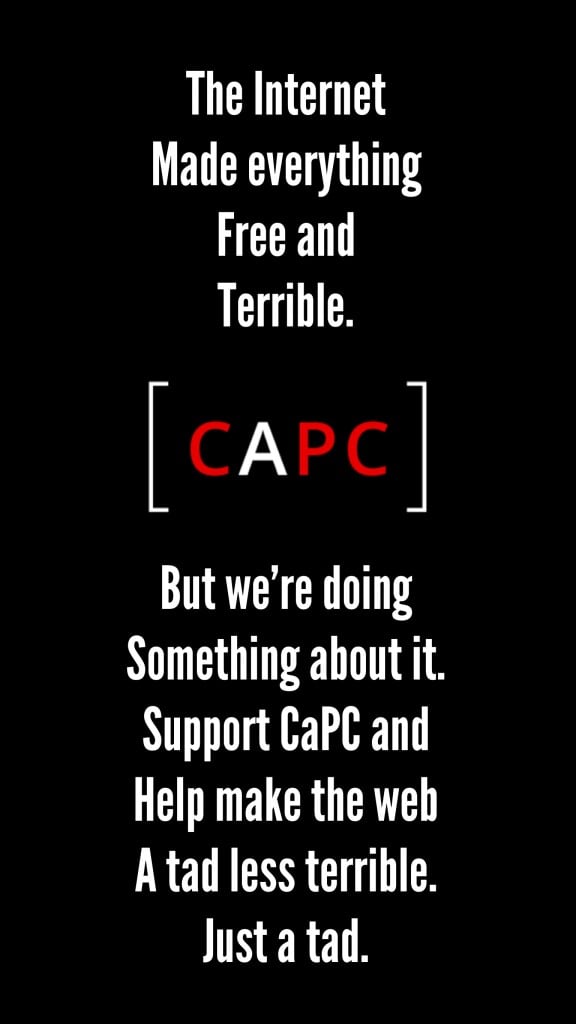by Nick Rynerson The following is an exclusive feature that has been shared with you but is otherwise available only in Issue #8 of the Christ and Pop Culture Magazine. For more features like this, download our app for iPad and iPhone from Apple’s App Store.
After a one-week free trial, monthly and yearly subscriptions are available for $2.99 and $29.99 respectively. New issues are made available every other week. More information here.

Once, a friend sincerely told me that he was “more spiritual than I” and I was more “theological.” It didn’t sit right. At the time I didn’t know why–I mean, on paper it made sense. He would always raise his hands during worship; I usually didn’t. He always “felt God telling him” something; that didn’t happen to me on a daily basis. And, to be fair, I read more books than he did, studied the Bible and commentaries more than he did, argued theology more than he did, and on top of that I was kind of a jerk.
A few years removed and a few sins repented of and I have come to see how common that interaction is. The assumption that those who live life with their emotions as their seeing-eye dog and their arms raised in worship services are the godly ones, and the ones who read the bible, study theology, and argue are the smart ones is one of the great plagues of the American Church. Christians tend to gravitate towards two particular ways of dealing with the mind: thinking that the mind holds you back or thinking that everybody else is held back and you are smarter than them . . . hmph! It plagues both the layfolk and the seminarians.
There are two dangerous, and ironically similar, diseases of the Christian mind that have troubled Christians since the early church: the well chronicled anti-intellectualism and the often rebelled against only-intellectualism. Okay, I will admit that I made up that last term, but the menace is real. At the center of anti-intellectualism is the lie that the life of the mind and the pursuit of objective, inexhaustible truth are worldly, faithless and divisive. This leads to arrogance and divisiveness with those who seem to be less enlightened to the truth. While only-intellectualism is a pursuit of objective, inexhaustible truth as the sole way man comes to God. This also leads to arrogance and divisiveness with those who seem to be less enlightened to the truth.
We cannot, in good conscience, faithfully follow Jesus without the intellect or with only the intellect. When either is attempted, historically, it ends in divisiveness and ruin.
The Designed Role of the Intellect
 The intellect was designed by God, like every other part of us, to serve a purpose and imitate an attribute of the Creator. Critical thought, learning and logic are seen by both God and man as early as Moses’ creation narrative. God deduces that it is not good for man to be alone in Genesis 2, while intellect plays a role as man’s mind is fooled by the serpent in Genesis 3. Job takes intellectual (often bad) counsel from his friends and Solomon writes Ecclesiastes as an intellectual assessment of the world. When Job is questioned by God in Job 38-41, it is an intellectual challenge– a reminder of the concrete truth of God and the logical consequences of that truth.
The intellect was designed by God, like every other part of us, to serve a purpose and imitate an attribute of the Creator. Critical thought, learning and logic are seen by both God and man as early as Moses’ creation narrative. God deduces that it is not good for man to be alone in Genesis 2, while intellect plays a role as man’s mind is fooled by the serpent in Genesis 3. Job takes intellectual (often bad) counsel from his friends and Solomon writes Ecclesiastes as an intellectual assessment of the world. When Job is questioned by God in Job 38-41, it is an intellectual challenge– a reminder of the concrete truth of God and the logical consequences of that truth.
Yet, the early apostolic church could be considered the ‘Genesis’ of the Christian intellect. Since it was the first mass indwelling of the Holy Spirit, it can be seen as the coming of the mind of Christ into God’s collective people. In the New Testament Church, “knowledge” was an important and stressed facet of the work of the Holy Spirit, a sharpening, strengthening agent of love and faithfulness. Paul teaches believers to use their minds to obey God, not just the emotional or supernatural components of their newfound faith:
We destroy arguments and every lofty opinion raised against the knowledge of God, and take every thought captive to obey Christ. (2 Corinthians 10:5)
Jesus, Paul, Peter, and James all spoke regularly of the capacity and importance of the mind in grasping truth, worshiping God, and living a godly life in the context of the life of the Church. Building off of the biblical and apostolic foundation, western Christians from the Early Church to the Enlightenment had a high regard for the mind because of their high regard for the Bible and Church tradition (which itself was, until the last few centuries, highly doctrinal and intellectual… even if the masses were not).
Sir Francis Bacon, who gets an undue reputation as an Enlightenment-era secularist (probably because he is still mentioned in high school science classes), actually founded his work on this cerebral Christian epistemology. Bacon saw truth and the pursuit of truth as invaluable and necessary component of human life. On which he wrote,
Truth, which only doth judge itself, teacheth that the inquiry of truth, which is the love-making, or wooing of it, the knowledge of truth, which is the presence of it, and the belief of truth, which is the enjoying of it, is the sovereign good of human nature. (Essays, Of Truth)
Bacon saw that the knowledge of truth was something outside of man, something that does not just fall upon the soul. He saw that it was a weighty matter that needed inquiry, wooing, and belief. How did Bacon believe that man enjoyed this sovereign good? Through learning:
Crafty men contemn studies, simple men admire them, and wise men use them; for they teach not their own use; but that is a wisdom without them, and above them, won by observation. Read not to contradict and confute; nor to believe and take for granted; nor to find talk and discourse; but to weigh and consider. (Essays, Of Study)
Bacon’s love of the God, evident in his essays, propelled him toward academic study not away from it. And from this love, he has left us with a longstanding spiritual and intellectual feast of writing.
The Corruption of the Mind
But something has gone awry. While the church has always been injured by intellectual brokenness, today in the American Church, the problem has turned gangrene.
Since the serpent in Genesis 3 deceived the mind of man, the intellect has been broken. Because of sin, we can no longer comprehend and behold God directly. We now only have a “mirror darkly.”
Like the extremes of Pharisee and lawlessness, the mind tends to swing between two opposite poles: Anti-intellectualism–where the mind is a hindrance to true faith, and Only-intellectualism–where knowledge is the purest, if not only, true virtue of the Christian.
These two distortions of the intellect have challenged the Church from the inside and outside for millennia through heresy, oppression, ignorance, and privilege. But today the church suffers from crippling anti-intellectualism in the pews and only-intellectualism in the pulpit. Prothero, the chair of religious studies at Un Mass believes that this, practically speaking, has its roots in the Public (or ‘Common’) School Movement of the 19th century:
Today Americans often think of public schools as bereft of religious influences. But when public schools spread throughout New England during the late eighteenth century and across the nation over the course of the nineteenth, religious was a daily presence . . . From the beginning, however, reformers struggled over how to make “common schools” truly common in a country that was so religiously diverse . . . The goal of public education was to produce good citizens. [The challenge was] how to inculcate religion without dividing denominations against one another and thereby undermining the unifying purpose of these “common schools.”
The solution emerged, early in Massachusetts and Ohio and eventually nationwide, centered on the concept of generic religion, which was variously described as “nonsectarianism” or “nondenominationalism”. The key figure behind the nondenominational or nonsectarian solution to the problem of religion in public education was Horace Mann, the education (and, not coincidentally, Unitarian) who served as the secretary of the Massachusetts Board of Education from its founding in 1837 until 1848…
. . . By the Civil War public schools were not quite “as godless as a steam engine” (as one wag in Cincinnati quipped), but the subject of religion had largely vanished from public school cirricula” (Prothero, Religious Literacy p.117-119, 124)
This has cultivated and nurtured the contemporary cultural climate of pure theological illiteracy outside of the church. From the New York Times wrongly attributing Hebrews 13:2 to W.B. Yeats to ubiquitous failing of this quiz taken by students at a top tier university, the mainstream American culture doesn’t know theology from Adam (get it?).
In the church things are not faring much better. Preachers and writers who emphasize emotion over doctrine have dominated the mass lay population of orthodox Evangelicalism for at least the past century, from the sensationalistic tent revivals of the south to D.L. Moody, who famously wisecracked “My theology! I didn’t know I had any.” To extract from Prothero again,
This spiritual anti-intellectualism- both highbrow and lowbrow, liberal and evangelical- drove a wedge into the Puritan synthesis of head and heart, forcing many Americans to make a Solomonic choice between the intellect and the emotions. As time went on, Americans by the millions who choose piety and check their intellects at the church-house door. They would endeavor not to know Jesus but to feel him. Indeed, this is the aim of much American Christianity today and it is with us every time, in Sunday schools and public schools alike, children pretend they don’t know something in order to be cool. (Prothero, Religious Literacy p.135)
So while flocks tussle about in anti-intellectualism, the “cream of the crop” fall prey to only-intellectualism. The disconnect is elitism, practiced by those who hate the anti-intellectual climate of the church. Instead of loving, instructing, and leading, “leaders” squabble with other “leaders” and fill their minds with a loveless intellectual activities. Arrogance breeds in blogs, books, sermons, and speech of church leaders and seminarians, where love is second to knowledge. Since the ones reading and writing are often those in the historical trap of intellectualism, the academic and publishing world easily becomes a weapon of unkind scrutiny, reproducing itself through tribalism.
Seminary grads come out of school trained theologians– defenders of truth, unequipped to speak gently to an immature believer or resolve a conflict lovingly. It is no wonder the Church suffers from a gap of engagement and a lack of excitement for the gospel (even when many are learning and fighting for Christological doctrines)!
The Hope for Change
 But I do believe that something can be done about the gap between anti-intellectualism and only-intellectualism in the church, and something is being done. God has been redeeming people out of anti-intellectualism and only-intellectualism since the Fall. God clothed Adam & Eve’s anti-intellectual decisions in animal skin and a promise of redemption. Jesus let Thomas, the doubter with sinful intellectual tendencies, touch his wounds. And when he did, Thomas repented!
But I do believe that something can be done about the gap between anti-intellectualism and only-intellectualism in the church, and something is being done. God has been redeeming people out of anti-intellectualism and only-intellectualism since the Fall. God clothed Adam & Eve’s anti-intellectual decisions in animal skin and a promise of redemption. Jesus let Thomas, the doubter with sinful intellectual tendencies, touch his wounds. And when he did, Thomas repented!
Grace has the power to rescue us from ourselves. Jesus didn’t die for the people who totally get the relationship between faith and knowledge. He died for people who don’t. And in this grace, there is room to work out these issues in freedom. We just have to see that it’s a problem.
We need introspection and repentance for wherever we fall on the dichotomy of anti to only. Both need love. Some in the trap of only-intellectualism think that they are sharp cultural or biblical critics, but whenever anybody reads or listens to them, people just think “what a jackass”. Because it is actually true that,
If I have prophetic powers and understand all mysteries and all knowledge, and if I have all faith, so as to remove mountains, but have not love, I am nothing. (1 Corinthians 13:2)
And for the anti-intellectualism, there is also grace. There needs to be a repentance based in love as well. We all seek to learn about what we love. For the anti-intellectual heart there may be a deeper issue of what we really love. Proverbs 9 says, “the fear of the Lord is the beginning of wisdom”. Wisdom comes from a relationship with God, not automatically, but through a stimulated intellect and heart. Fear of God, or a right understanding of God, leads us to search out wisdom. And if we are going to be as holistic about the nature of wisdom as the Bible is this includes, but is not limited to, study and pursuit of intellectual truth.
And on a bigger scale, there is much we can do to assist and cultivate a Church that values the intellect as an agent of love. And do not be dismayed; there is much that is already being done.
The Future of the Christian Mind
In the last generation or so in the Western Church, people like Dr. Tim Keller, Henri Nouwen, the late C.S. Lewis and Dr. Richard Lovelace have carried on the tradition of knowledgeable, intelligent orthodoxy. Not to say that these men were/are pure academics writing studious volumes on theological concepts, but they see the life of the mind as an important part of loving God and loving people.
By reading and wrestling with ideas and studying good work on orthodoxy, anti-intellectuals can participate in an upbuilding practice of discipling their mind and communicating with others who desire to do the same. For these people, I have attached a reading list that might be helpful (not comprehensive) in this endeavor. But what it boils down to is seeing theology, history, and other disciplines not as irrelevant schoolwork but as agents of truth, understanding, and relationship with God.
For the only-intellectuals, this means maybe backing away from some of the more weighty subjects that you read to feel good about yourself. It means sitting in and soaking in something like Henri Nouwen’s “In The Name of Jesus”, an 80 page book all about leading by being captivated by the love and kindness of Jesus. Or possibly avoiding the Twitter and blog debates out of a desire to love as well as you learn.
But overall, it is about turning from ourselves to God. Using the mind rightly as a tool to excavate the amazing truth of God and his creation.
Reading List
Nick Rynerson is a writer, nostalgic and enthusiasm enthusiast living in Normal, Illinois. In his free time, He writes, attempts to play mandolin, reads and hangs out with his groovy wife. Nick is passionate about the Church, orthodoxy and whatever he’s been reading about recently. Illustration courtesy of Seth T. Hahne. Check out Seth’s graphic novel and comic review site, Good Ok Bad.
